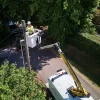BT Warns One in Five Small UK Firms Still on “Analogue” Lines

Telecoms giant BT migrated 300,000 UK business customers away from legacy phone lines and on to digital broadband and phone solutions in 2024. But the provider claims that 22% of small businesses still see themselves as “analogue“, relying on tools like traditional landlines, paper contracts and fax machines, which must change before the old service is switched-off.
In case anybody has forgotten, the big switch-off was recently delayed to 31st January 2027 in order to give broadband ISPs, phone providers, telecare providers, councils and consumers more time to adapt (details). But the main focus of this delay was the 1.8 million people who use vital home telecare systems in the UK (e.g. elderly, disabled, and vulnerable people), which often aren’t compatible with the replacement VoIP / IP-based digital phone services (i.e. for everybody else the deadline is still technically Dec 2025).
However, it’s not only consumers that will be impacted by this, with businesses also needing to make the switch. A national survey of small businesses, which was commission by BT and conducted via Censuswide with over 1,500 senior decision-makers, claims to have found that 22% still define themselves as “analogue”, primarily using traditional processes such as physical filing systems, paper contracts, and older technology such as fax machines. By contrast, 80% that have invested in new technology say it has given them a competitive advantage, with 79% saying it had helped them to find new customers.
Advertisement
The UK is estimated to be home to 5.5 million small and medium-sized enterprises (SME), thus there are still likely to be quite a few organisations that are behind in their preparations for the change. BT warns that businesses failing to migrate sooner than the cut-off date will also be at risk of “increased outages” as the ageing network becomes more fragile. Ofcom’s recent Connected Nations report highlights that the number of incidents on the legacy PSTN increased by 45% in 2024.
Kerry Small, Chief Operating Officer for Business at BT, said:
“The UK’s analogue copper telephone network has a proud history, but it’s no longer up to the task for businesses. It’s simply too risky to build the economy on a shaky foundation, and we’re calling on all businesses to move before the end of 2025 – well ahead of the switch-off.
Analogue companies making the move now can benefit from rock-solid digital connectivity to help keep them in business for years to come. We’re supporting customers small and large through the move, so no business is left behind. Whether you’re a tech start-up or a family firm passed down through generations, when it comes to going digital – BT’s got your back.”
Any technology still relying on the PSTN will stop working when the network is retired.
Mark is a professional technology writer, IT consultant and computer engineer from Dorset (England), he also founded ISPreview in 1999 and enjoys analysing the latest telecoms and broadband developments. Find me on X (Twitter), Mastodon, Facebook, BlueSky, Threads.net and Linkedin.
« Gigaclear Complete FTTP Broadband Build to Large Oxfordshire Village






















































There has been more than enough warning. For most small businesses the outlay is likely to be comparatively small in the grand scheme of things.
Thats because they are happy with what they have and its the least of their worries upgrading something that works fine
Sure, until it bites them in the ass. They put off today, today becomes tomorrow, then next year, until they scramble once they’re told ‘we aren’t going to wait for you anymore’.
Way I see it, it’ll basically be the student that rushes their essay the night before it’s due
I’d say it doesn’t help that BT makes it so difficult to move from business POTS to cloud voice. I’ve been involved with this with someone and it was a shambles to get it done, though once in it of course worked fine. The actual number port occured without incident, it was just getting the new services ordered and installed that was problematic.
I’d suggest that they need to bin those “BT local business” franchises who are beyond useless and bring it in house.
Compare that to the residential side where it is truly seamless, especially if you already have a compatible smart hub.
… see, I *can* criticise BT when there’s something to criticise them for!
There are a lot more issues with the removal of copper lines than BT are letting on. Almost no one is aware that the water industry relies on 25’000 PSTN lines to function in terms of fault checking and remote monitoring of the water system. It is the only power available in rural areas were pumping stations are situated and there is no like for like replacement meaning the safety of the water industry is a huge concern with this stupidity of closing lines which aren’t fragile as BT would have you believe they just don’t want to run two networks and pay the energy costs for the powered lines. There is a huge national security problem of having only broadband lines. It means hackers from anywhere in the world can interfere with the telephone system simply because it’s online. An issue which has occurred in Australia several times. You can’t hack an analogue line unless you are attached to the line. It’s not just the water industry relying on the PSTN lines either. Emergency phones on lifts you don’t want needed to have battery back up rather than from a powered line that is more stable. The engery network, motorway signage, traffic lights, house alarms and the emergency phones service for the elderly all are relying on copper lines to work and no of them have ever been on the main power grid or needed back up to work when the grid or internet is down because the powered lines are more stable than the main power grid. It is an absolutely stupid idea to remove a system simply because they can’t be bothered to run the two systems at the same time. Not to mention that VoIP simply doesn’t work properly itself has been around since the early 2000s it’s not a new idea and it has never been good enough to use as the only phone system. It has no geographical location either so it opens up more fraudulent telephone activity than less and making more difficult for police to trace numbers. BTs stupid decision will result in major issues in the future and will leave people isolated and huge safety concerns across the country. It will lead to deaths and injuries because of this. It’s the most idiotic idea. The government and regulator should have stopped this dead in it’s tracks as country wide safety issue. An example is the storms of 1987 when I was a child we had no power for several days but the phone never stopped working and was a vital lifeline in our rural community. That’s what the copper lines are a lifeline and they need to stay in place as a safety fullback. Simple as that.
A solution for lift phones could be used.
Digital Voice doesn’t use the Internet. You are labouring under a misapprehension. It operates in a private IP space on the same last mile connection. It is not ‘The Internet’. The closure of the PSTN is also *not* the closure of the PSTN. They are separate projects, there will be last mile copper for years. The PSTN closure is because the very newest local exchange in the telephone network is now 27 years old and part, support and expertise are thin on the ground.
Why is it BT or any other telco’s problem that the electricty company has chosen not to supply power to critical national infrastructure?
Ah, the water industry, not preparing for, or investing in, the future. What a surprise.
All pumping station have power, How do you think they would work without power ?
@Bob – Presumably the energy network is also somehow connected to the mains.
Motorway comms go nowhere near Openreach’s network – it may well be copper, but it’s not Openreach’s.
The argument is just bizarre. What equipment is sitting on the end of these lines that magically works without any power? If the mains fails then traffic lights stop working, because traffic lights need power. The loss of comms to the lights feels like a secondary problem to the lights no longer working.
@Jon Attwood:
BT does not have to offer the water industry a solution that it feels it cannot provide on a commercial basis. Perhaps the water companies should look to another provider for their specialist requirements.
Some water company gauges use analogue leased lines – not PSTN – to send current via a gauge and reports on water level, for example. An analogue leased line is just a loop of copper, rented from Openreach, there is no equipment in the exchange, the copper loop runs from gauge to the water company building. As has been said here already, PSTN closure is not the same as copper closure, so these copper lines will persist for ~years longer, though not forever, eventually some new solution will be required that does not need a massive copper network with 1000s of buildings to exist indefinitely for a handful of remaining requirements. The “Internet of Things” world contains of options based on very low power/low radio bandwidth for simple gauges like this.
Okay. You picking up the bill, Jon? If a matter of tens of thousands want to keep it that’s over 4,000 exchanges that need paying for alongside somehow sourcing the equipment. The line rental is going to be pretty meaty. You aren’t expecting everyone else on full fibre to pick up the bill, right? Accepted wisdom that city dwellers subsidise the rural service due to geography, asking us to pay because people want to keep the legacy network at pretty huge cost per customer is an ask. There has never been copper to a million+ properties.
Given the kit to keep it going isn’t made anymore parts are cannibalised and calls on most networks even made over copper become IP as the PSTN switching equipment isn’t really a thing anymore not too scared of a move to IP.
Must be some meaty phone line bundles going to these pumping stations if they’re running everything there off the power the exchange is providing.
Battery backup power sources will be provided, some of these solutions have battery backup and a mobile SIM to preserve connectivity for the vulnerable. Full and partial fibre networks have battery backup and in some cases generator power.
Retiring the copper based PSTN when it happens isn’t some world first experiment. Bits of the United States have done it. Portugal has done it. Spain. Various other European nations have it in progress. Various Pacific nations have it either largely complete or in progress. We are an outlier in being late to it and we’re late to it largely because some groups refuse to prepare for it and then plead to government to delay it, again, so that they can do nothing, again, but plead for more time to spend doing nothing.
Missed a bit. On traffic lights in the case of this city CityFibre have been contracted to get fibre to all of them. If mains power fails a battery can keep the telemetry flowing briefly to indicate power failure or the optical unit can send a ‘dying gasp’ with the last of its power and after that connectivity to the lights is kinda academic given they’re dead. I doubt this city is in any way unique. Traffic lights have street cabinets nearby to hold comms equipment in.
Motorway signage is served by a huge fibre optic network, the National Roads Telecommunications Services. It’s in the purple ducts you see around when work is being done and is buried after.
IoT type devices LoRaWAN: https://en.m.wikipedia.org/wiki/LoRa alongside regular cellular, fibre or LEO/MEO satellite.
Lifts need a battery backup that lasts an hour, tops. Long enough for the issue to be reported and to receive an ETA on repairs or an evacuation attempt.
Home alarms can go IP unless they suck. The alarms have a battery backup, they need telemetry for as long as they’ve power after that it’s academic.
The vulnerable as mentioned there are options right up to satellite fallback.
It’s bizarre. The idea that the only thing that can keep vulnerable people safe is to rely on a network where the very newest exchange was installed 26 years ago and some date from the early 80’s – 40 year old kit. There’s no manufacturer support, no new parts, the experts are retired or retiring and the network survives only because usage of it has diminished so much that it’s possible to keep it working with cannibalisation – up to a point. If it’s not closed soon in a controlled and considered way it will do it all by itself in a way that might not be recoverable. Old things break, and they break good.
No-one, anywhere in the world is investing in TDM switching and as a result no-one, anywhere in the world is building or selling public network scale telephone exchanges and associated kit.
D’oh – typo. PSTN closure is not copper closure.
Also – Digital Voice is absolutely tied to a physical location.
Why do you believe all these non truths?
First of all, digital voice requires a broadband connection to work, that is the internet for most people as the internet is the connection that allows you to be online. Secondly I stated that digital voice has no geographical location not a physical location those are two different things. The physical location is were the digital line is connected to the router of course it has that. But your digital voice number is not tied to where you are in the country you can use a number from a completely different part of the country that has an area code no where near your actual location. It means your geographical location is not fixed as it is with an analogue line. Whilst I agree that the water industry is completely useless in this case there is no alternative for the industry to be migrated on to so in this case the fault lies with Openreach. The PSTN and copper lines are two sides of the same coin it’s splitting hairs to say one is different to the other when each will be closed or else the power switched off by the same timescale so it amounts to the same thing. Lastly if you are in a lift that has stopped working you’d prefer a backup in place that doesn’t have a timescale before it too runs out of charge hence why a hard wired powered line is a safer option than a battery pack.
What do companies like Virgin Media etc. offer? New build areas do not get copper installed.
That’s untrue Jon, again.
DV requires a data connection. It doesn’t have to be a functional broadband service with Internet access. Even if it does use the same last mile connection as an Internet service it is completely separate to the Internet and cannot be reached by Internet ‘hackers’. It exists in a completely separate, private IP space. If somehow the public Internet failed the DV service would still work.
And DV is absolutely tied to physical location. Why do you think that it isn’t? You cannot order a DV line with a phone number from a different part of the country.
And you’re still wrong about PSTN closure and copper switch off. Copper will be in place for perhaps another decade. The PSTN won’t.
The shutdown of the PSTN is a distinct topic from the copper network decommissioning. To illustrate the difference, I have an FTTC broadband connection with the connection to the street cabinet made over a copper connection. This however is no longer part of the PSTN given that I have dissed the line and have been moved to a SoGEA connection with no onward connection to the PSTN network from the street cabinet.
Still awaiting FTTP here from any provider.
OR has a monopoly here regarding coverage of ADSL and FTTC. Even with places that have FTTP (although most of those also have VM as an option now too)
Out of interst, where is your “here”?
Quite why Telecare providers need so long is baffling, The existing telecare device either works with digital or not, If not they should provided a new device
How can this be when there are the constant press releases saying; Tranche 1, 2…19 shut off by Openreach to enforce analogue stop sell and forcing everyone in this region to upgrade to digital?
Many businesses will not engage until it directly impacts them. That will not happen until the shutdown of the PSTN starts in their area – if they last that long.
You answered yourself with the mention of ‘analogue stop sell’.